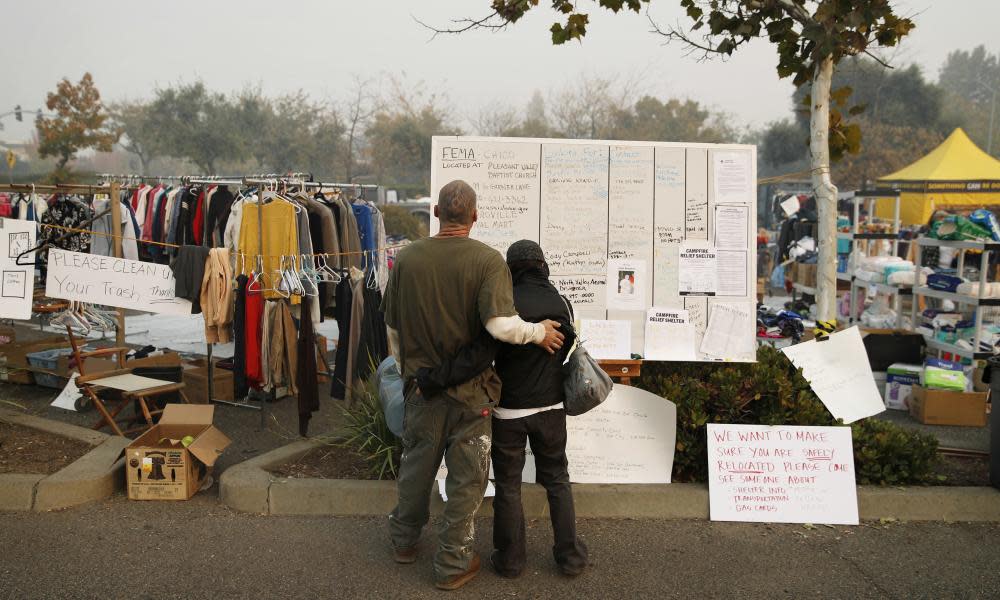‘It’s our job to help’: the genealogists tracking down missing people after devastating fires

On a recent Saturday, as fires raged across much of the US west coast, Nancy Collins, 42, received a Facebook message from a friend: “Do you angels feel like helping find people again?”
Collins, a genetic genealogist in the San Francisco Bay area, didn’t hesitate: “Of course.”
Two years ago, the pair, along with several others with expertise in genealogy and digital sleuthing, came together to help locate some of the many people who had gone missing following the catastrophic wildfires in Paradise, California. Collins and her fellow genealogical experts are known as “search angels” and, along with the support of several administrators, they have ultimately helped to connect nearly 250 people with their family and friends.
In the months that followed, there were times when it seemed they would need to join forces once again, such as after fires in Australia, but the group has largely remained on hiatus.
Until now, that is.
With a new series of devastating fires that have burned millions of acres and killed more than 30 people in Oregon, California and Washington, including a firefighter, the search angels had been resurrected to help reunite families and friends and bring closure to those desperately in need of it.
“Even if something is not as it seems or maybe it doesn’t turn out right, you still want to know where they are,” said Collins. “If they take the time to post then they’re obviously concerned and it’s our job to help find them, I feel, because there’s nowhere else that’s going to help them.”
Within 24 hours after Collins received that initial message, the group had launched a fresh Facebook page, called Oregon Fires Missing People 2020, and added a welcome message. By the next day, they had already received their first plea for help –a woman was looking for two people in Eagle Point, Oregon, both of whom an angel was able to safely locate that same day.
The search angels’ methodology for tracking people down involves a thorough search of publicly available information related to the missing person. Their main tools are online public databases, genealogy databases and social media.
Cynthia Traut, 51, a genetic genealogist in the group, said the first step is to get whatever information the person requesting their help has on the individual. They’ll then use a myriad of databases, such as Spokeo.com, BeenVerified.com and Ancestry.com to pull background checks, find property deeds and sift through lists of residents at particular addresses.
They’ll reach out to the person’s relatives, neighbors and associates, to see if anyone has seen the individual. If that doesn’t do it, Traut said, they’ll start contacting shelters and scouring their message boards.

Today, the group, which, although focused in Oregon is prepared to help in Washington and California as well, has about 250 members and its team of four angels and four administrators has worked to locate more than a dozen people.
Often, as in a recent case in Oregon, creative thinking and persistence is required when a search hits a snag.
A few days ago, the group received a request for help from a woman who couldn’t find her friend Jerry from Mill City. She didn’t know his last name, but had a photo, an address, along with his approximate age and height.
Traut said the search should have been relatively straightforward. But the address was slightly off and when they did find the correct one several doors down, they discovered that the man hadn’t lived there long enough for his full name to pop up through a public records search. Traut, along with others in the group, tried other avenues, such as contacting places he frequented and even digging up obituaries.
But ultimately the answer came when someone reached out to the friend, letting her know Jerry was safe and had been put up at a shelter by the American Red Cross.
In another case, the group was contacted by a woman in Oregon about her missing brother. Traut said five minutes after she pulled a background check, the woman let her know that his remains had been found.
Traut said these fires feel different to 2018, when they were slammed with pleas for help. She remembers being up some days for 20 hours straight, searching for those still unaccounted for. This time around, it has been a bit more like a steady trickle.
“That was a different fire. It was something like, ‘go, get out’,” she said. “It was horrific what happened to Paradise and some of the neighboring towns. Here it’s horrific too, we’re talking a couple thousand homes gone. But people had a few more minutes to get out.”
Traut, who lives in Prospect, Oregon, has had her truck packed in case she needs to evacuate. She said it could very likely get busy again, as people start to take stock of their community, and perhaps realize they haven’t heard from a friend or neighbor for a little while. Whatever the workload, she said she’s ready.
“I have the skills; I want to help. I’ve always been the type of person that’s wanted to help people,” she said. “I could not imagine not knowing if my loved ones were OK and not have the resources or know where to go for resources to make sure they’re OK.”

 Yahoo News
Yahoo News 
